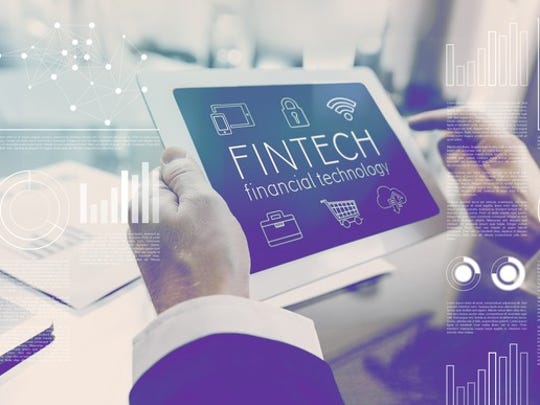Many companies routinely allow you to shop for investments, apply for loans, check credit reports and much more through electronic means. In recent years, the term "fintech" has been used to describe some of these innovations, especially those geared around smartphones.
But some fintech companies are seeking to offer services that could skirt important consumer protections, warns a new report from the National Consumer Law Center. The study sees fintech developments as part of a trend to weaken key safeguards, with the potential for more fraud, deception or other costs.
Innovation in the financial field is of prime importance to Arizona, which in 2018 became the first state to allow fintech companies to offer trial runs of their services, with less regulatory oversight, through its new "sandbox" program.
Tax time tangles: Tax refund fraud: IRS crackdown ensnares legitimate taxpayers
Life insurance tips: Don't dismiss insurance as too pricey. Here's how to pick a plan
What is fintech and who is pursuing it?
Fintech stocks are still up nicely year-to-date, even with recent market volatility. (Photo: Getty Images)
There isn't a hard definition but the term, which is short for "financial technology," refers to a range of innovative ways for consumers to shop for loans, make payments, check credit scores and bank balances, improve investing success and so on.
While innovation long has been integral to the financial industry, the term increasingly refers to services that can be conducted on computers, smart phones and tablets, usually with no human intermediaries.
Financial companies up and down the food chain are heavily engaged in innovation and finding new ways to serve customers better and increase profits. But the fintech label mostly is applied to young, technology-driven startups rather than banking, investment and insurance giants pursuing many of the same goals.
What are some new fintech services?The National Consumer Law Center report cited a number of fintech products and services such as new ways for lenders to evaluate credit applications and possibly enhance consumer credit scores. Others offer faster and more convenient loan applications. Some lenders enable workers to access earned wages before they have been paid, while others offer student loan refinancing.
Also, new subscription arrangements allow drivers to access vehicles without actually owning them or making long-term commitments. In the investment realm, robo-advisers offer customized recommendations with no human interaction, and there are fintech tools for budgeting, saving and bill paying.
Other services offer access to virtual currencies, allow customers to facilitate payments across international borders or share in the appreciation potential of home ownership with strangers.
NEWSLETTERSGet the Managing Your Money newsletter delivered to your inboxWe're sorry, but something went wrongA collection of articles to help you manage your finances like a pro.Please try again soon, or contact Customer Service at 1-800-872-0001.Delivery: FriInvalid email addressThank you! You're almost signed up for Managing Your MoneyKeep an eye out for an email to confirm your newsletter registration.More newsletters
While speed and convenience are frequent hallmarks, most of these services aren't all that novel.

(Photo: Getty Images)
"Many fintech products are just variations on older financial products and services," wrote the report's author, Lauren Saunders, associate director of the National Consumer Law Center. "A loan is still a loan."
Are there potential benefits?Yes. The report noted that new fintech approaches could lower costs for consumers, expand financial services to more people such as lower-income households, speed up loan applications and other processes, make it easier to comparison shop, broaden access to credit and improve personal financial management overall.
"I am hopeful that fintech companies will use the power of mobile phones and real-time alerts to help people budget, save and manage their lives without resorting to high-cost loans," Saunders said in an interview.
As another example, she cited small-dollar lending options that could be preferable to credit cards, such as by offering predictable, fixed payment schedules.
What are some of the risks?Saunders said she's concerned that many fintech companies are trying to offer services without being subject to consumer protections such as the right to dispute credit-card charges or question information contained in credit reports.
Saunders said she senses a definite intention by some companies to evade consumer-protection laws. In certain cases, "These are really just excuses to take away protections without close oversight," she said.
Lack of transparency also can be a problem, as some fintech products don't clearly state their fees or other costs.
"Sometimes the costs are hidden or are not revealed until after a consumer begins the sign-up process," the report read. "Sometimes the cost is not in dollars but in the use, sharing or selling of the consumer's personal information."
Her report described privacy policies that are opaque, and it can be difficult for consumers to tell if a company employs strong electronic data security. Breaches are common even with giant corporations, and many fintech players are small startups.
Without human intermediaries or local offices, it can be hard to fix problems if they arise.
"Interactions that take place entirely on a mobile device have no paper record of the agreement or paper statements to call attention to fees and charges," the report said.
What about the 'sandbox' trials?A few states are mulling the idea of letting fintech companies test their services without obtaining the usual licenses or complying to the same degree with consumer-protection laws – trial programs called "sandboxes." The idea is to encourage innovation with less regulatory oversight.
Arizona became the first state to do this last year and has attracted three fintech firms to its sandbox.
Grain Technology Inc. is testing customized savings plans and opportunities for consumers to obtain small lines of credit so as to avoid costly bank overdraft fees.
Sweetbridge NFP is testing a lending product using blockchain software with an interest rate cap of 20 percent, which the Arizona Attorney General's Office said is much lower than rates allowed under Arizona law.
Omni Mobile Inc. is testing purportedly faster, cheaper processing of guest payments at a resort in Tucson.

In a lawsuit against the Arizona Board of Regents, Arizona Attorney General Mark Brnovich seeks to force an Omni Hotel slated for University Drive and Mill Avenue to pay property taxes. (Photo: Tom Tingle/The Republic)
Attorney General Mark Brnovich said regulators need to catch up with fintech innovation and that "Arizona has embraced this reality and is rapidly becoming a hub for innovation."
State Rep. Jeff Weninger, R-Chandler, who sponsored the legislation, cited the sandbox as a sign Arizona is becoming a "leader in attracting innovation and economic development."
Companies must inform consumers of their participation in the sandbox and must adhere to consumer-protection laws, the Attorney General's Office said. But Saunders is skeptical, noting that there's less oversight, consumer protections might be relaxed and there's often poor transparency, with companies revealing little about their operations.
With the sandboxes, Saunders sees potential for states to "endorse things that legislators don't understand."
As for common claims made by fintech firms of providing new consumer benefits, spurring innovation and enhancing economic development, the same claims are routinely made by other businesses too, she noted.
How should consumers respond?The gist of Saunders' report is that people need to remain as vigilant as ever, maybe more so, when dealing with new approaches and companies in the financial industry. If a company offers, say, a no-interest loan, look for higher fees elsewhere or possible selling or sharing of personal information.
It's notable that some past industry developments, such as adjustable-rate mortgages and automated loan-application processes, didn't always turn out so well. These same approaches could have been viewed as fintech developments in their day, though they weren't called that at the time.
"Just because something is fast and easy doesn't mean it's a good idea," Saunders said, adding that policymakers should resist calls to weaken consumer protections.
Reach Wiles at russ.wiles@arizonarepublic.com or 602-444-8616.
No comments :
Post a Comment